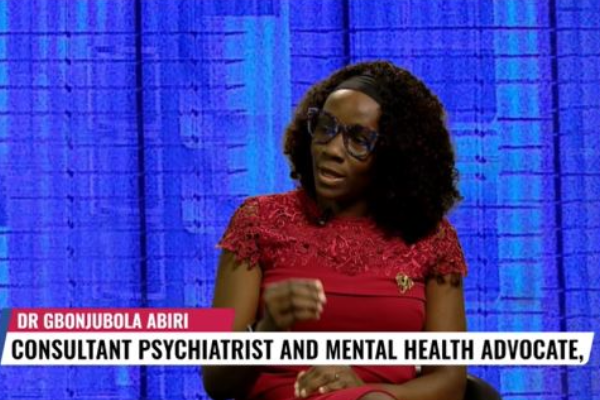Nigerians were once described as being some of the happiest people on earth, but it’s no longer the case, as they have now become the most depressed people in Africa, according to latest figures released by the World Health Organisation.
This has resulted in far-reaching consequences. The suicide rate in the country and indeed across the world is on the increase.
Experts in the field of mental health say there’s a link between depression and climbing suicide rates.
Dr. Gbonjubola Abiri, consultant, psychiatrist, and mental health advocate, speaking on the rising spate of suicide on Monday’s edition of TVCBreakfast, said suicide is self intentioned, self inflicted harm whereby the individual knows what it is that they want to do, and they know that the outcome at the end of the day is going to be fatal.
According to her, for different people at different times, at different seasons of their lives, the reason for why they may decide to die by suicide will be different. It will be different for different age groups, different genders, socioeconomic status as well.
She said what mental health consultants found out is that more often than not, in more than 80% of people who go on to take their life by suicide, there’s usually an underlying undiagnosed, undetected and untreated mental health condition. And so in about 80% of those cases, you’d find that these individuals may have an underlying mood disorder such as depression, a psychotic disorder such as schizophrenia, substance abuse problems such as alcohol use disorders, or even physical conditions that they are finding difficult to manage because all of those conditions already have complications.
According to her, there are times when individuals die by suicides under intense pressure, when they feel a loss of control or a high degree of hopelessness.
In those situations, people can decide when they are impulsive. They just take that impulsive decision without thinking about what’s the next best thing that can happen to me. That perhaps it is better to end it all by suicide.
Addressing the issue, Dr Maymunah Kadiri, a mental health advocate and psychiatrist said people believe that when you have it all together, you are not at risk of taking your life.
Psychiatrists, according to her are very deliberate in choosing their words especially when it to suicide.
” We don’t use the word commit suicide, because the moment you say commit, it means that it’s criminal. It’s a criminal offense and in Nigeria, we know that it’s a misdemeanor.
“If you try to take your life, it’s one year imprisonment, we rather use the word died by suicide.
“Even when people look like they have it all put together, it doesn’t mean that their life internally or behind the scene is put together
Dr Kadiri said untreated, undetected depression is highly linked to people that take their life, even substance abuse people can take their life on impulse.
She added that when people have relationship crises, financial crisis, chronic pain, chronic illnesses, it can be very impulsive and they can just take their lives just like that because sometimes at that point in time they may be feeling hopeless, worthless and helpless.
While suicides are quite high in young people, we also find that an attempt to complete suicide is actually higher in older people, according to Dr Abiri.
“In older people, what they tend to do is that they tend to engage in what is known as deliberate self harm. Deliberate self harm may not be evidence to everyone and so they may attempt to refuse to eat, refuse care, refuse to use their medication, but in a way that, you know, each and every day they are slowly using it.
“It is also important that we highlight that suicides also happen in elderly persons and when they also go ahead to do it, they do it in such a way that they want their definitive about it and it is more likely than not to happen.
Nigerians were once described as being some of the happiest people on earth, but it’s no longer the case, as they have now become the most depressed people in Africa, according to latest figures released by the World Health Organisation.
This has resulted in far-reaching consequences. The suicide rate in the country and indeed across the world is on the increase.
Experts in the field of mental health say there’s a link between depression and climbing suicide rates.
Dr. Gbonjubola Abiri, consultant, psychiatrist, and mental health advocate, speaking on the rising spate of suicide on Monday’s edition of TVCBreakfast, said suicide is self intentioned, self inflicted harm whereby the individual knows what it is that they want to do, and they know that the outcome at the end of the day is going to be fatal.
According to her, for different people at different times, at different seasons of their lives, the reason for why they may decide to die by suicide will be different. It will be different for different age groups, different genders, socioeconomic status as well.
She said what mental health consultants found out is that more often than not, in more than 80% of people who go on to take their life by suicide, there’s usually an underlying undiagnosed, undetected and untreated mental health condition. And so in about 80% of those cases, you’d find that these individuals may have an underlying mood disorder such as depression, a psychotic disorder such as schizophrenia, substance abuse problems such as alcohol use disorders, or even physical conditions that they are finding difficult to manage because all of those conditions already have complications.
According to her, there are times when individuals die by suicides under intense pressure, when they feel a loss of control or a high degree of hopelessness.
In those situations, people can decide when they are impulsive. They just take that impulsive decision without thinking about what’s the next best thing that can happen to me. That perhaps it is better to end it all by suicide.
Addressing the issue, Dr Maymunah Kadiri, a mental health advocate and psychiatrist said people believe that when you have it all together, you are not at risk of taking your life.
Psychiatrists, according to her are very deliberate in choosing their words especially when it to suicide.
” We don’t use the word commit suicide, because the moment you say commit, it means that it’s criminal. It’s a criminal offense and in Nigeria, we know that it’s a misdemeanor.
“If you try to take your life, it’s one year imprisonment, we rather use the word died by suicide.
“Even when people look like they have it all put together, it doesn’t mean that their life internally or behind the scene is put together
Dr Kadiri said untreated, undetected depression is highly linked to people that take their life, even substance abuse people can take their life on impulse.
She added that when people have relationship crises, financial crisis, chronic pain, chronic illnesses, it can be very impulsive and they can just take their lives just like that because sometimes at that point in time they may be feeling hopeless, worthless and helpless.
While suicides are quite high in young people, we also find that an attempt to complete suicide is actually higher in older people, according to Dr Abiri.
“In older people, what they tend to do is that they tend to engage in what is known as deliberate self harm. Deliberate self harm may not be evidence to everyone and so they may attempt to refuse to eat, refuse care, refuse to use their medication, but in a way that, you know, each and every day they are slowly using it.
“It is also important that we highlight that suicides also happen in elderly persons and when they also go ahead to do it, they do it in such a way that they want their definitive about it and it is more likely than not to happen.
Nigerians were once described as being some of the happiest people on earth, but it’s no longer the case, as they have now become the most depressed people in Africa, according to latest figures released by the World Health Organisation.
This has resulted in far-reaching consequences. The suicide rate in the country and indeed across the world is on the increase.
Experts in the field of mental health say there’s a link between depression and climbing suicide rates.
Dr. Gbonjubola Abiri, consultant, psychiatrist, and mental health advocate, speaking on the rising spate of suicide on Monday’s edition of TVCBreakfast, said suicide is self intentioned, self inflicted harm whereby the individual knows what it is that they want to do, and they know that the outcome at the end of the day is going to be fatal.
According to her, for different people at different times, at different seasons of their lives, the reason for why they may decide to die by suicide will be different. It will be different for different age groups, different genders, socioeconomic status as well.
She said what mental health consultants found out is that more often than not, in more than 80% of people who go on to take their life by suicide, there’s usually an underlying undiagnosed, undetected and untreated mental health condition. And so in about 80% of those cases, you’d find that these individuals may have an underlying mood disorder such as depression, a psychotic disorder such as schizophrenia, substance abuse problems such as alcohol use disorders, or even physical conditions that they are finding difficult to manage because all of those conditions already have complications.
According to her, there are times when individuals die by suicides under intense pressure, when they feel a loss of control or a high degree of hopelessness.
In those situations, people can decide when they are impulsive. They just take that impulsive decision without thinking about what’s the next best thing that can happen to me. That perhaps it is better to end it all by suicide.
Addressing the issue, Dr Maymunah Kadiri, a mental health advocate and psychiatrist said people believe that when you have it all together, you are not at risk of taking your life.
Psychiatrists, according to her are very deliberate in choosing their words especially when it to suicide.
” We don’t use the word commit suicide, because the moment you say commit, it means that it’s criminal. It’s a criminal offense and in Nigeria, we know that it’s a misdemeanor.
“If you try to take your life, it’s one year imprisonment, we rather use the word died by suicide.
“Even when people look like they have it all put together, it doesn’t mean that their life internally or behind the scene is put together
Dr Kadiri said untreated, undetected depression is highly linked to people that take their life, even substance abuse people can take their life on impulse.
She added that when people have relationship crises, financial crisis, chronic pain, chronic illnesses, it can be very impulsive and they can just take their lives just like that because sometimes at that point in time they may be feeling hopeless, worthless and helpless.
While suicides are quite high in young people, we also find that an attempt to complete suicide is actually higher in older people, according to Dr Abiri.
“In older people, what they tend to do is that they tend to engage in what is known as deliberate self harm. Deliberate self harm may not be evidence to everyone and so they may attempt to refuse to eat, refuse care, refuse to use their medication, but in a way that, you know, each and every day they are slowly using it.
“It is also important that we highlight that suicides also happen in elderly persons and when they also go ahead to do it, they do it in such a way that they want their definitive about it and it is more likely than not to happen.
Nigerians were once described as being some of the happiest people on earth, but it’s no longer the case, as they have now become the most depressed people in Africa, according to latest figures released by the World Health Organisation.
This has resulted in far-reaching consequences. The suicide rate in the country and indeed across the world is on the increase.
Experts in the field of mental health say there’s a link between depression and climbing suicide rates.
Dr. Gbonjubola Abiri, consultant, psychiatrist, and mental health advocate, speaking on the rising spate of suicide on Monday’s edition of TVCBreakfast, said suicide is self intentioned, self inflicted harm whereby the individual knows what it is that they want to do, and they know that the outcome at the end of the day is going to be fatal.
According to her, for different people at different times, at different seasons of their lives, the reason for why they may decide to die by suicide will be different. It will be different for different age groups, different genders, socioeconomic status as well.
She said what mental health consultants found out is that more often than not, in more than 80% of people who go on to take their life by suicide, there’s usually an underlying undiagnosed, undetected and untreated mental health condition. And so in about 80% of those cases, you’d find that these individuals may have an underlying mood disorder such as depression, a psychotic disorder such as schizophrenia, substance abuse problems such as alcohol use disorders, or even physical conditions that they are finding difficult to manage because all of those conditions already have complications.
According to her, there are times when individuals die by suicides under intense pressure, when they feel a loss of control or a high degree of hopelessness.
In those situations, people can decide when they are impulsive. They just take that impulsive decision without thinking about what’s the next best thing that can happen to me. That perhaps it is better to end it all by suicide.
Addressing the issue, Dr Maymunah Kadiri, a mental health advocate and psychiatrist said people believe that when you have it all together, you are not at risk of taking your life.
Psychiatrists, according to her are very deliberate in choosing their words especially when it to suicide.
” We don’t use the word commit suicide, because the moment you say commit, it means that it’s criminal. It’s a criminal offense and in Nigeria, we know that it’s a misdemeanor.
“If you try to take your life, it’s one year imprisonment, we rather use the word died by suicide.
“Even when people look like they have it all put together, it doesn’t mean that their life internally or behind the scene is put together
Dr Kadiri said untreated, undetected depression is highly linked to people that take their life, even substance abuse people can take their life on impulse.
She added that when people have relationship crises, financial crisis, chronic pain, chronic illnesses, it can be very impulsive and they can just take their lives just like that because sometimes at that point in time they may be feeling hopeless, worthless and helpless.
While suicides are quite high in young people, we also find that an attempt to complete suicide is actually higher in older people, according to Dr Abiri.
“In older people, what they tend to do is that they tend to engage in what is known as deliberate self harm. Deliberate self harm may not be evidence to everyone and so they may attempt to refuse to eat, refuse care, refuse to use their medication, but in a way that, you know, each and every day they are slowly using it.
“It is also important that we highlight that suicides also happen in elderly persons and when they also go ahead to do it, they do it in such a way that they want their definitive about it and it is more likely than not to happen.
Nigerians were once described as being some of the happiest people on earth, but it’s no longer the case, as they have now become the most depressed people in Africa, according to latest figures released by the World Health Organisation.
This has resulted in far-reaching consequences. The suicide rate in the country and indeed across the world is on the increase.
Experts in the field of mental health say there’s a link between depression and climbing suicide rates.
Dr. Gbonjubola Abiri, consultant, psychiatrist, and mental health advocate, speaking on the rising spate of suicide on Monday’s edition of TVCBreakfast, said suicide is self intentioned, self inflicted harm whereby the individual knows what it is that they want to do, and they know that the outcome at the end of the day is going to be fatal.
According to her, for different people at different times, at different seasons of their lives, the reason for why they may decide to die by suicide will be different. It will be different for different age groups, different genders, socioeconomic status as well.
She said what mental health consultants found out is that more often than not, in more than 80% of people who go on to take their life by suicide, there’s usually an underlying undiagnosed, undetected and untreated mental health condition. And so in about 80% of those cases, you’d find that these individuals may have an underlying mood disorder such as depression, a psychotic disorder such as schizophrenia, substance abuse problems such as alcohol use disorders, or even physical conditions that they are finding difficult to manage because all of those conditions already have complications.
According to her, there are times when individuals die by suicides under intense pressure, when they feel a loss of control or a high degree of hopelessness.
In those situations, people can decide when they are impulsive. They just take that impulsive decision without thinking about what’s the next best thing that can happen to me. That perhaps it is better to end it all by suicide.
Addressing the issue, Dr Maymunah Kadiri, a mental health advocate and psychiatrist said people believe that when you have it all together, you are not at risk of taking your life.
Psychiatrists, according to her are very deliberate in choosing their words especially when it to suicide.
” We don’t use the word commit suicide, because the moment you say commit, it means that it’s criminal. It’s a criminal offense and in Nigeria, we know that it’s a misdemeanor.
“If you try to take your life, it’s one year imprisonment, we rather use the word died by suicide.
“Even when people look like they have it all put together, it doesn’t mean that their life internally or behind the scene is put together
Dr Kadiri said untreated, undetected depression is highly linked to people that take their life, even substance abuse people can take their life on impulse.
She added that when people have relationship crises, financial crisis, chronic pain, chronic illnesses, it can be very impulsive and they can just take their lives just like that because sometimes at that point in time they may be feeling hopeless, worthless and helpless.
While suicides are quite high in young people, we also find that an attempt to complete suicide is actually higher in older people, according to Dr Abiri.
“In older people, what they tend to do is that they tend to engage in what is known as deliberate self harm. Deliberate self harm may not be evidence to everyone and so they may attempt to refuse to eat, refuse care, refuse to use their medication, but in a way that, you know, each and every day they are slowly using it.
“It is also important that we highlight that suicides also happen in elderly persons and when they also go ahead to do it, they do it in such a way that they want their definitive about it and it is more likely than not to happen.
Nigerians were once described as being some of the happiest people on earth, but it’s no longer the case, as they have now become the most depressed people in Africa, according to latest figures released by the World Health Organisation.
This has resulted in far-reaching consequences. The suicide rate in the country and indeed across the world is on the increase.
Experts in the field of mental health say there’s a link between depression and climbing suicide rates.
Dr. Gbonjubola Abiri, consultant, psychiatrist, and mental health advocate, speaking on the rising spate of suicide on Monday’s edition of TVCBreakfast, said suicide is self intentioned, self inflicted harm whereby the individual knows what it is that they want to do, and they know that the outcome at the end of the day is going to be fatal.
According to her, for different people at different times, at different seasons of their lives, the reason for why they may decide to die by suicide will be different. It will be different for different age groups, different genders, socioeconomic status as well.
She said what mental health consultants found out is that more often than not, in more than 80% of people who go on to take their life by suicide, there’s usually an underlying undiagnosed, undetected and untreated mental health condition. And so in about 80% of those cases, you’d find that these individuals may have an underlying mood disorder such as depression, a psychotic disorder such as schizophrenia, substance abuse problems such as alcohol use disorders, or even physical conditions that they are finding difficult to manage because all of those conditions already have complications.
According to her, there are times when individuals die by suicides under intense pressure, when they feel a loss of control or a high degree of hopelessness.
In those situations, people can decide when they are impulsive. They just take that impulsive decision without thinking about what’s the next best thing that can happen to me. That perhaps it is better to end it all by suicide.
Addressing the issue, Dr Maymunah Kadiri, a mental health advocate and psychiatrist said people believe that when you have it all together, you are not at risk of taking your life.
Psychiatrists, according to her are very deliberate in choosing their words especially when it to suicide.
” We don’t use the word commit suicide, because the moment you say commit, it means that it’s criminal. It’s a criminal offense and in Nigeria, we know that it’s a misdemeanor.
“If you try to take your life, it’s one year imprisonment, we rather use the word died by suicide.
“Even when people look like they have it all put together, it doesn’t mean that their life internally or behind the scene is put together
Dr Kadiri said untreated, undetected depression is highly linked to people that take their life, even substance abuse people can take their life on impulse.
She added that when people have relationship crises, financial crisis, chronic pain, chronic illnesses, it can be very impulsive and they can just take their lives just like that because sometimes at that point in time they may be feeling hopeless, worthless and helpless.
While suicides are quite high in young people, we also find that an attempt to complete suicide is actually higher in older people, according to Dr Abiri.
“In older people, what they tend to do is that they tend to engage in what is known as deliberate self harm. Deliberate self harm may not be evidence to everyone and so they may attempt to refuse to eat, refuse care, refuse to use their medication, but in a way that, you know, each and every day they are slowly using it.
“It is also important that we highlight that suicides also happen in elderly persons and when they also go ahead to do it, they do it in such a way that they want their definitive about it and it is more likely than not to happen.
Nigerians were once described as being some of the happiest people on earth, but it’s no longer the case, as they have now become the most depressed people in Africa, according to latest figures released by the World Health Organisation.
This has resulted in far-reaching consequences. The suicide rate in the country and indeed across the world is on the increase.
Experts in the field of mental health say there’s a link between depression and climbing suicide rates.
Dr. Gbonjubola Abiri, consultant, psychiatrist, and mental health advocate, speaking on the rising spate of suicide on Monday’s edition of TVCBreakfast, said suicide is self intentioned, self inflicted harm whereby the individual knows what it is that they want to do, and they know that the outcome at the end of the day is going to be fatal.
According to her, for different people at different times, at different seasons of their lives, the reason for why they may decide to die by suicide will be different. It will be different for different age groups, different genders, socioeconomic status as well.
She said what mental health consultants found out is that more often than not, in more than 80% of people who go on to take their life by suicide, there’s usually an underlying undiagnosed, undetected and untreated mental health condition. And so in about 80% of those cases, you’d find that these individuals may have an underlying mood disorder such as depression, a psychotic disorder such as schizophrenia, substance abuse problems such as alcohol use disorders, or even physical conditions that they are finding difficult to manage because all of those conditions already have complications.
According to her, there are times when individuals die by suicides under intense pressure, when they feel a loss of control or a high degree of hopelessness.
In those situations, people can decide when they are impulsive. They just take that impulsive decision without thinking about what’s the next best thing that can happen to me. That perhaps it is better to end it all by suicide.
Addressing the issue, Dr Maymunah Kadiri, a mental health advocate and psychiatrist said people believe that when you have it all together, you are not at risk of taking your life.
Psychiatrists, according to her are very deliberate in choosing their words especially when it to suicide.
” We don’t use the word commit suicide, because the moment you say commit, it means that it’s criminal. It’s a criminal offense and in Nigeria, we know that it’s a misdemeanor.
“If you try to take your life, it’s one year imprisonment, we rather use the word died by suicide.
“Even when people look like they have it all put together, it doesn’t mean that their life internally or behind the scene is put together
Dr Kadiri said untreated, undetected depression is highly linked to people that take their life, even substance abuse people can take their life on impulse.
She added that when people have relationship crises, financial crisis, chronic pain, chronic illnesses, it can be very impulsive and they can just take their lives just like that because sometimes at that point in time they may be feeling hopeless, worthless and helpless.
While suicides are quite high in young people, we also find that an attempt to complete suicide is actually higher in older people, according to Dr Abiri.
“In older people, what they tend to do is that they tend to engage in what is known as deliberate self harm. Deliberate self harm may not be evidence to everyone and so they may attempt to refuse to eat, refuse care, refuse to use their medication, but in a way that, you know, each and every day they are slowly using it.
“It is also important that we highlight that suicides also happen in elderly persons and when they also go ahead to do it, they do it in such a way that they want their definitive about it and it is more likely than not to happen.
Nigerians were once described as being some of the happiest people on earth, but it’s no longer the case, as they have now become the most depressed people in Africa, according to latest figures released by the World Health Organisation.
This has resulted in far-reaching consequences. The suicide rate in the country and indeed across the world is on the increase.
Experts in the field of mental health say there’s a link between depression and climbing suicide rates.
Dr. Gbonjubola Abiri, consultant, psychiatrist, and mental health advocate, speaking on the rising spate of suicide on Monday’s edition of TVCBreakfast, said suicide is self intentioned, self inflicted harm whereby the individual knows what it is that they want to do, and they know that the outcome at the end of the day is going to be fatal.
According to her, for different people at different times, at different seasons of their lives, the reason for why they may decide to die by suicide will be different. It will be different for different age groups, different genders, socioeconomic status as well.
She said what mental health consultants found out is that more often than not, in more than 80% of people who go on to take their life by suicide, there’s usually an underlying undiagnosed, undetected and untreated mental health condition. And so in about 80% of those cases, you’d find that these individuals may have an underlying mood disorder such as depression, a psychotic disorder such as schizophrenia, substance abuse problems such as alcohol use disorders, or even physical conditions that they are finding difficult to manage because all of those conditions already have complications.
According to her, there are times when individuals die by suicides under intense pressure, when they feel a loss of control or a high degree of hopelessness.
In those situations, people can decide when they are impulsive. They just take that impulsive decision without thinking about what’s the next best thing that can happen to me. That perhaps it is better to end it all by suicide.
Addressing the issue, Dr Maymunah Kadiri, a mental health advocate and psychiatrist said people believe that when you have it all together, you are not at risk of taking your life.
Psychiatrists, according to her are very deliberate in choosing their words especially when it to suicide.
” We don’t use the word commit suicide, because the moment you say commit, it means that it’s criminal. It’s a criminal offense and in Nigeria, we know that it’s a misdemeanor.
“If you try to take your life, it’s one year imprisonment, we rather use the word died by suicide.
“Even when people look like they have it all put together, it doesn’t mean that their life internally or behind the scene is put together
Dr Kadiri said untreated, undetected depression is highly linked to people that take their life, even substance abuse people can take their life on impulse.
She added that when people have relationship crises, financial crisis, chronic pain, chronic illnesses, it can be very impulsive and they can just take their lives just like that because sometimes at that point in time they may be feeling hopeless, worthless and helpless.
While suicides are quite high in young people, we also find that an attempt to complete suicide is actually higher in older people, according to Dr Abiri.
“In older people, what they tend to do is that they tend to engage in what is known as deliberate self harm. Deliberate self harm may not be evidence to everyone and so they may attempt to refuse to eat, refuse care, refuse to use their medication, but in a way that, you know, each and every day they are slowly using it.
“It is also important that we highlight that suicides also happen in elderly persons and when they also go ahead to do it, they do it in such a way that they want their definitive about it and it is more likely than not to happen.














